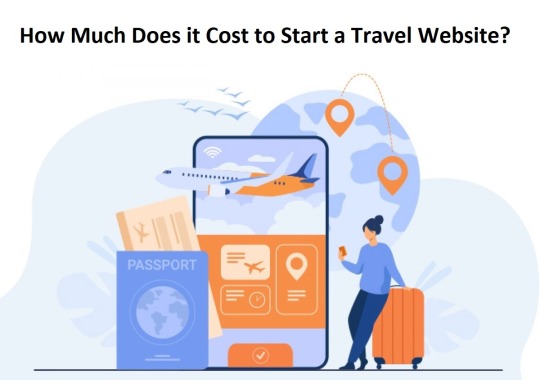#costoftravelwebsite
Text
How Much Does it Cost to Start a Travel Website?

In this digital era, establishing an online presence is crucial for businesses, particularly in the dynamic travel industry. If you're a business owner with dreams of creating a travel website, understanding the associated costs is a crucial first step. Fear not! We're here to guide you through the intricacies of starting a travel website without breaking your budget.
The Average Cost To Start a Travel Website
Creating a simple travel website typically ranges from $3,000 to $10,000, while more complex websites can go upwards of $50,000. However, the exact cost depends on various factors such as the inclusion of advanced features, integration of third-party tools, the choice of Content Management System (CMS), the timeline for development, and other considerations. Below we break down the factors that affect directly on the cost of starting travel website:
1. Domain Name and Hosting:
The first step is securing a unique domain name and a reliable hosting service. Domain prices can vary, depending on factors such as domain extension and availability. Hosting costs, likewise, depend on the provider and the specific plan you choose. Popular hosting platforms include Bluehost, SiteGround, and HostGator.
2. Website Design and Development:
Crafting an appealing and functional website is essential for success. There are two primary options here: you can use user-friendly website builders like WordPress, Wix, or Squarespace, or you can opt for professional agency. As they recognize the unique needs of the travel industry and offer specialized travel web design services. They are dedicated to creating visually stunning and highly functional websites tailored to the specific requirements of travel businesses.
3. Content Creation:
Engaging content is the lifeblood of any travel website. High-quality images, well-crafted copy, and captivating videos enhance the user experience. Consider budgeting for professional photography, copywriting services, and multimedia content creation. Investing in content creation can significantly elevate the overall appeal of your travel website.
4. SEO and Marketing:
Building your website is only half the battle; the other half is ensuring it's visible to your target audience. Search Engine Optimization (SEO) is crucial for improving your site's ranking on search engines. Allocate a portion of your budget to SEO practices and consider investing in marketing strategies such as social media advertising and email campaigns to drive traffic to your website.
5. Maintenance and Updates:
Regular maintenance and updates are vital to keep your website secure and up-to-date. Factor in the cost of ongoing support, security measures, and software updates. This ensures that your travel website continues to provide a seamless experience for users while staying protected against potential threats.
Conclusion
Starting a travel website involves various costs, but it's an investment that can yield substantial returns. By carefully planning and allocating your budget, you can create a stunning and functional website that attracts and retains your target audience. Remember, the key is to strike a balance between cost-effectiveness and quality, ensuring that your travel website becomes a valuable asset for your business.
0 notes